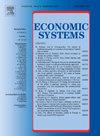Green central banking and game theory: The Chicken Game-approach
IF 3.3
2区 经济学
Q1 ECONOMICS
引用次数: 0
Abstract
This paper investigates the determinants of the probability that a central bank chooses to make its financial sector green. We derive a mixed-strategy Nash equilibrium from a strategic setting of two monetary authorities choosing simultaneously between the alternatives of greening and conducting business as usual. Using a very general setup, we obtain a model that nests most of the usual 2 × 2-situations in game theory. “Green” avoids a country’s contribution to an externality experienced by both, but also encompasses a sacrifice of slowing down economic performance. The probability of greening is found to decrease whenever “greening” means a larger sacrifice for the other country, while it increases with the size of both countries, the rate of internalization applied to the externality as well as the severity of this externality. Unlike the typical (pure) free-riding approach to international coordination on environmental issues, we find some willingness of countries to sacrifice wealth for the sake of avoiding a worst case. In a repeated setting, cooperative solutions can be established. The influence of discounting on the stability of these solutions is ambiguous.
绿色中央银行与博弈论:小鸡博弈法
本文研究了中央银行选择使其金融部门绿色化的概率决定因素。我们从两个货币当局同时在 "绿化 "和 "照常营业 "之间做出选择的策略设置中推导出一个混合策略纳什均衡。通过一个非常一般的设置,我们得到了一个模型,该模型嵌套了博弈论中大多数常见的 2 × 2 情境。"绿化 "避免了一个国家对双方都经历的外部性的贡献,但也包含了减缓经济表现的牺牲。当 "绿化 "意味着另一国做出更大的牺牲时,绿化的概率就会降低,而当两国的规模、外部性的内部化率以及外部性的严重程度越高时,绿化的概率就会越高。与典型的(纯粹的)搭便车式环境问题国际协调方法不同,我们发现一些国家愿意为避免最坏情况而牺牲财富。在重复的情况下,可以建立合作解决方案。贴现对这些解决方案稳定性的影响并不明确。
本文章由计算机程序翻译,如有差异,请以英文原文为准。
求助全文
约1分钟内获得全文
求助全文
来源期刊

Economic Systems
ECONOMICS-
CiteScore
4.90
自引率
0.00%
发文量
83
审稿时长
48 days
期刊介绍:
Economic Systems is a refereed journal for the analysis of causes and consequences of the significant institutional variety prevailing among developed, developing, and emerging economies, as well as attempts at and proposals for their reform. The journal is open to micro and macro contributions, theoretical as well as empirical, the latter to analyze related topics against the background of country or region-specific experiences. In this respect, Economic Systems retains its long standing interest in the emerging economies of Central and Eastern Europe and other former transition economies, but also encourages contributions that cover any part of the world, including Asia, Latin America, the Middle East, or Africa.
 求助内容:
求助内容: 应助结果提醒方式:
应助结果提醒方式:


